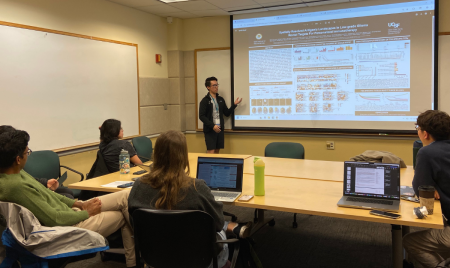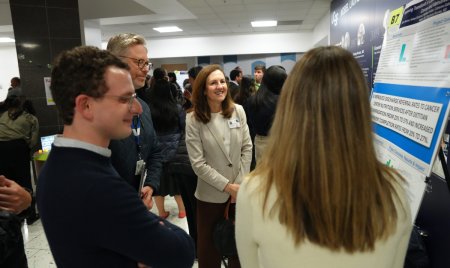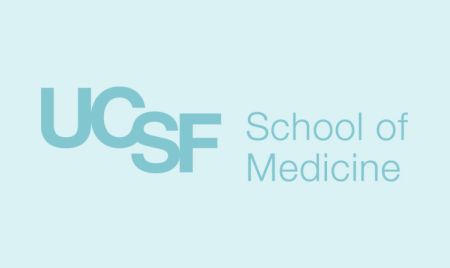Black Day of Healing 2024: Addressing a “Specific and Exceptional” Need

Dr. Simon Feseha, UCSF third-year internal medicine resident, Dr. Tosin Adebiyi, UCSF second-year psychiatry resident, and Dr. Josten Overall, UCSF third-year pediatrics resident, all know each other from having gone to medical school together in Colorado, but they don’t get to see each other often now.
“I feel exuberant!” exclaims Dr. Tosin Adebiyi, a second-year UCSF psychiatry resident. “This day is so important because there aren’t many of us Black residents, and we don’t get to see each other regularly, so it helps us feel like we belong here.”
She is talking about Black Day of Healing, the fourth annual observance that brings Black and Brown residents and fellows, as well as allies, together to rest, engage, and build community with each other. It is a day that highlights UCSF’s commitment to prioritizing diversity, equity, belonging, and anti-oppression.
A Need for Healing
After the murders of George Floyd, Breonna Taylor, Ahmaud Arbery, and too many other Black Americans, as well as the disproportionate effect that COVID-19 had on Black and Brown people, former UCSF resident Dr. Tiana Woolridge recognized that Black and Brown residents and fellows urgently needed an opportunity to get together in a safe space. Thus, the Day of Black Healing, or Black Healing Day, began. The inaugural observance in 2020 took place over Zoom.
This year’s all-day event was sponsored by the Black Caucus at UCSF, the UCSF Office of Diversity and Outreach, and UCSF GME Diversity, and was held at the Black Wellness Center within the Women’s Health Resource Center on Sutter Street. For the first time since the event’s inception, faculty and staff were invited to join residents and fellows for part of the day.
“Community building is our main hope for this day, but we also want to provide a chance to rest and focus on wellness,” says Dr. Ursula Griffiths-Randolph, a graduating UCSF pediatric resident, who will return next year as a chief resident. “We try to address multiple aspects of wellness, like spiritual wellness, social wellness, financial wellness, and physical wellness.”
The 65 attendees participated in meditation and yoga sessions led by the Clinic’s program director, B. Stroud, a speed meeting session, a presentation on financial wellness from Autumn Greene, an independent Black financial planner and founder of My Stewardship Journey, and dinner at an attending physician’s home.
Dr. Griffiths-Randolph attended Black Day of Healing for the first time in 2021 and has been involved with planning since 2022. Both as a doctor and a colleague, she says, “I’m here to take care of Black folks; we have specific and exceptional needs.”
The Importance of Community
“Residency is incredibly challenging,” Dr. Griffiths-Randolph continues. “So, feeling supported by a Black community is essential; this community is a space where we don’t have to explain certain things because there’s a shared understanding of the unifying experience of Blackness in this country,” she says.
San Francisco has the lowest percentage of Black people of any metropolitan area in the U.S. “It’s hard to find a sense of community in the city,” says Dr. Griffiths-Randolph. “My parents are West African, but there are no West African stores here—and it’s expensive to get my hair done!” She has recently moved to Oakland where she says she sees more Black faces in the community, but not at the hospital.
“We’re pretty siloed in our programs,” says Dr. Josh Philippe, a first-year UCSF psychiatry resident who grew up in South Florida with Haitian parents. “Community is super important to me, and it was a huge part of my medical school experience at NYU, so I’m always looking for opportunities for Black and Brown residents to get together; even if I don’t talk to everyone, I just need to know those spaces exist.”
Dr. Philippe recently attended the 2024 Student National Medical Association (SNMA) Annual Medical Education Conference (AMEC) in New Orleans, which is the largest assembly of underrepresented minority medical and premedical students in the United States and the Caribbean.
“Socializing with residents in other programs and in psych programs at other schools felt enriching and fulfilling,” he says. “I left feeling rejuvenated, and that’s how I feel today, too.”
“This day makes me feel connected,” echoes Dr. Pierrot Rutagarama, a second-year family medicine resident. “It heals, as is its intention, and I leave refreshed, empowered, and recentered.”
In addition to attending, Dr. Rutagarama is also on the Black Day of Healing committee with seven other residents, including Dr. Griffiths-Randolph, who planned the event. “It’s a time investment for a group of people without much free time, but I wanted to help,” he says. “I wanted to contribute to creating a safe space because I feel safe here. Of course, institutions are imperfect, as are people, but I feel like there’s a real commitment to meaningful social change at UCSF.”
Healthy Doctors, Healthy Patients: Reaffirming Intentions
The community that underrepresented residents and fellows find during their training at UCSF not only impacts them as people, but also the people they treat as doctors.
“A lot of us are looking for community because I think we’re really at our best when we’re able to be ourselves—our authentic selves,” Dr. Rutagarama says.
Being at one’s “best” is particularly important in making sound healthcare decisions and establishing crucial rapport with patients and other care team members. Helping Black and Brown doctors embrace their authentic selves and feel their best at work is one of the aims of Dr. Rutagama’s side project, RUTAwear.com, scrubs “Designed to Celebrate Identity.” “It helps me combat burnout,” he says, “and makes me excited to come to work!”
Most of the patients he treats at Zuckerberg San Francisco General Hospital are underserved, but he is aware that, in San Francisco, there are not enough Black doctors to see every Black patient who would like to see one because there are not a lot of Black doctors—or Black people—here and not a lot of Black doctors in the U.S. as a whole.
However, there is plenty of evidence that health outcomes for Black patients in America are worse than for white patients. The newly opened BLOOM clinic at UCSF Benioff in Oakland is an example of Black doctors trying to address healthcare disparities in Black mothers and babies.
A recent paper in JAMA Network suggests that Black patients fare better with a Black doctor, and the effect of racial concordance between provider and patient is a subject of ongoing research.
What residents and fellows attested to at Black Day of Healing, however, is that race concordance works both ways.
“When I interact with Black or immigrant patients, there is a different connection that reminds me of why I started this journey,” says Dr. Rutagarama.
Thinking back on the camaraderie he experienced with other Black psychiatry residents at SNMA AMEC, Dr. Philippe says similarly, “I was reminded that one reason I chose to work in psychiatry is so I could help people process racist experiences, which is, unfortunately, a unifying thread that connects Black people everywhere. By the time many young Black and Brown kids get to school, they’ve inherently learned that they’re not as good. I want to be someone they see who looks like them and can help them navigate their existence.”









